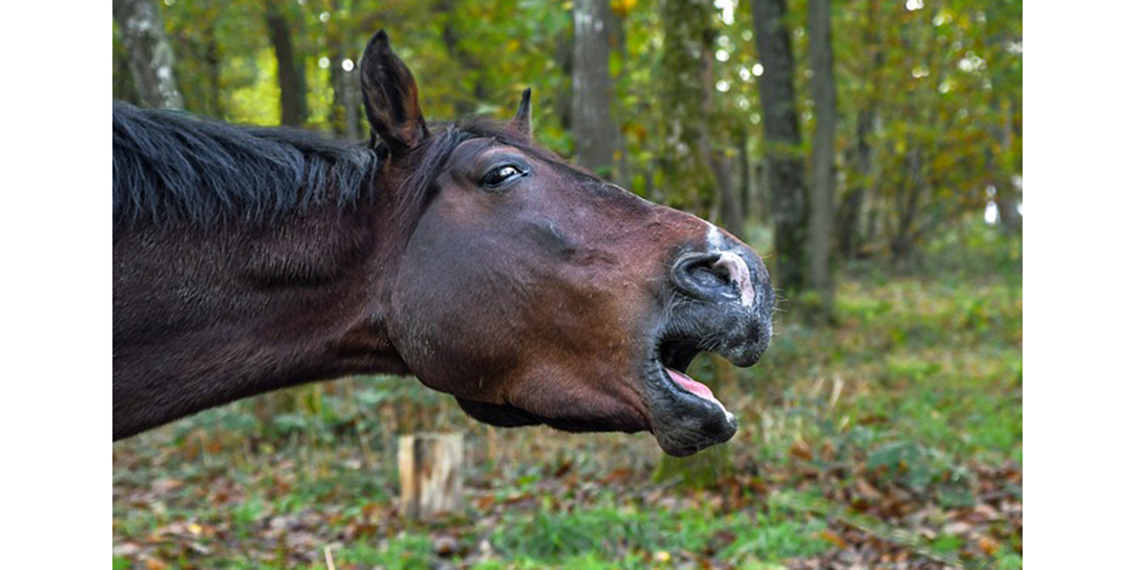When Is That Cough More Than A Cough?
Friday, February 3, 2023 | Mary Phelps

Many horses cough when they first start working and many riders panic when it happens. While it is true that coughing during work can be a sign of a respiratory issue, veterinarians note that it’s not actually that uncommon for horses to cough briefly when they come out of the stall and start working.
Photo: Picsabay – Christel Sagniez
“Coughing once or twice at the beginning of exercise is normal and is a way for the horse to clear mucus and debris in the upper airway,” said Dr. Laura Javsicas, an internal medicine specialist with Rhinebeck Equine in Rhinebeck, N.Y. “Horses are unique in how air flows through their lungs at rest and during exercise. At rest, air moves very slowly through the lungs but dramatically increases with work. This is one reason why when they start working there is a big change in lung function. Their lungs aren’t being challenged at rest.”
When to Be Concerned
The time to be concerned, she said, is when coughing continues as the horse keeps working or when the horse shows signs of exercise intolerance, such as not wanting to go forward or continue work. “Some horses will actually just stop.”
Dr. Laurent Couëtil, a professor of Large Animal Internal Medicine and director of Equine Research Programs at Purdue University’s College of Veterinary Medicine, said he would be concerned if a cough “becomes more frequent than usual or is associated with performance issues such as prolonged recovery or increased breathing efforts compared to the amount of work performed.”
Javsicas said another sign of a breathing issue is when, after working, it takes a horse longer than usual for its breathing to return to normal. This can be evident if a horse is standing in its stall still breathing heavily quite some time after working. For horses that just recovered from a recent respiratory infection, a cough during work or longer recovery time might also be a sign of residual inflammation “and tells you that maybe that horse just needs a little more time off to recover fully,” she said.
Pay Attention to the Type of Cough
Couëtil said that it is also important for riders to pay attention to the type of cough because it can help identify the cause. “Cough receptors extend from larynx to small airways deep in the lungs. Any irritation or inflammation of the respiratory mucosa from throat to deep lung can trigger a cough. Irritation of the upper airway tends to result in a dry and loud cough – for example laryngitis, influenza – whereas inflammation in the lung tends to result in a deep and productive cough – pneumonia, severe asthma.”
Another clear indicator of a potential problem, Javsicas said, is nasal discharge that is not clear. “If the discharge is clear or white, then it’s probably just increased mucus production from something like allergies and is not a great concern. But if it is yellow or greenish, that’s a sign of infection and needs to be investigated.”
Environmental Factors
Environmental factors, such as seasonal allergies and dusty riding rings, can also cause horses that normally don’t cough to begin to do so when in work. Couëtil said if dust is an issue, riders should sprinkle water on riding rings before starting work. Letting horses drop their head and neck down at the start of exercise can also help clear the mucus that can trigger a cough, he said.
Javsicas said environmental factors also includes the weather. “If it’s a hot, humid day the horse might move and recover more slowly than on a cool day.”
The bottom line, said both Couëtil and Javsicas, is for riders not to panic at the first sign of a cough but to know what is normal for their horse and to pay attention when it becomes abnormal.















